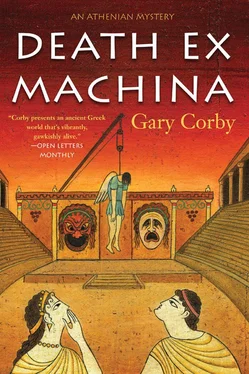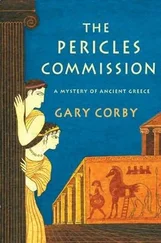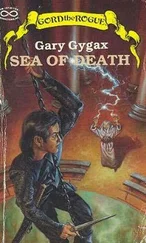Gary Corby - Death Ex Machina
Здесь есть возможность читать онлайн «Gary Corby - Death Ex Machina» весь текст электронной книги совершенно бесплатно (целиком полную версию без сокращений). В некоторых случаях можно слушать аудио, скачать через торрент в формате fb2 и присутствует краткое содержание. Год выпуска: 2015, ISBN: 2015, Издательство: Soho Press, Жанр: Исторический детектив, на английском языке. Описание произведения, (предисловие) а так же отзывы посетителей доступны на портале библиотеки ЛибКат.
- Название:Death Ex Machina
- Автор:
- Издательство:Soho Press
- Жанр:
- Год:2015
- ISBN:978-1-61695-520-5
- Рейтинг книги:3 / 5. Голосов: 1
-
Избранное:Добавить в избранное
- Отзывы:
-
Ваша оценка:
- 60
- 1
- 2
- 3
- 4
- 5
Death Ex Machina: краткое содержание, описание и аннотация
Предлагаем к чтению аннотацию, описание, краткое содержание или предисловие (зависит от того, что написал сам автор книги «Death Ex Machina»). Если вы не нашли необходимую информацию о книге — напишите в комментариях, мы постараемся отыскать её.
Death Ex Machina — читать онлайн бесплатно полную книгу (весь текст) целиком
Ниже представлен текст книги, разбитый по страницам. Система сохранения места последней прочитанной страницы, позволяет с удобством читать онлайн бесплатно книгу «Death Ex Machina», без необходимости каждый раз заново искать на чём Вы остановились. Поставьте закладку, и сможете в любой момент перейти на страницу, на которой закончили чтение.
Интервал:
Закладка:
Petros spoke another word, and the bearers began to walk in time. A young lady among the mourners carried a flute. Another held a lyre. They raised their instruments and began to play the epicedium , the funeral song in praise of the deceased, a slow, sad song in the Lydian mode.
The bearers walked with identical manner: heads down, shoulders bowed as if under the weight of the world. Their steps dragged in the dust. They might have been marching to their own funerals. They said not a word.
Petros stepped in behind the men who carried the body. Maia was by his side. Petros raised his arm, so that everyone could see the spear of vengeance.
The other members of the household filed in behind them. They began the customary sobbing and cries of despair. The rest of us-friends, neighbors, and the simply curious-took our places behind the family. Diotima and I were careful to place ourselves directly behind the official mourners, so that we could watch.
The funeral procession marched north at a slow pace. Most families would carry their dead along the main roads, to garner the most attention. Instead, the professional mourners wended their way through all the minor streets, a long, unwieldy path. It seemed an odd decision, if only because it forced everyone who followed to squeeze together. But the choice of route had an interesting effect. People who weren’t used to funerals passing down their street poked their heads out of windows to see what was happening. Many of these were interested enough to join the line, to watch the show. The tail of followers became longer and longer, and the more it lengthened, the more interesting the event became and the more joined.
By the time we arrived at Ceramicus, there were many hundreds of onlookers. The long line passed through the gates of the cemetery.
Ceramicus has been the official burial ground of Athens since time immemorial. I didn’t know how many of my ancestors lay in the ground beneath my feet, but the line must have stretched back to the time of King Theseus and beyond. I knew that one day I, too, would lie here.
The bearers stopped by a funeral pyre that had been freshly built. They placed the board that carried Romanos upon the exact center, then stepped back, rubbing their sore arms.
Beside the body, upon the pyre, the women laid out three changes of clothing, which was the maximum that the law allowed. They returned with sweet cakes, which they placed beside his hands, for Romanos to eat on his journey to the underworld. Normally a family would send a loved one to Hades with some decent jewelry or fine belongings, but here there was nothing, until Maia approached.
Maia held the only extra grave goods that the family intended to offer. In her right hand she carried the mask of tragedy, in her left the mask of comedy. She laid the masks reverently beside her brother.
Petros took up a burning torch, one made of rags wrapped around a pole, the whole dipped in olive oil. He walked about the pyre, touching the torch to every part.
As the flames rose, one of the men cast scented oil from an amphora that he held under his left arm. He held a scoop in his right hand, from which he flung droplets across the entire funeral pyre as he walked about. The oil sizzled everywhere it fell and a pleasantly sweet smell enwrapped everyone who watched.
The fire had built remarkably quickly. Sometimes, if a fire hadn’t been stacked properly, the flames would exhaust before the body had been fully consumed, leaving the relatives with a gruesome problem and the guests with an unpleasant sight. There were no mistakes here though. I guessed the family of Romanos had used something to make sure the fire burned to the last bit of fuel. Nor was the pyre overstocked, another mistake that happened when nervous relatives overdid it, which would force the onlookers to step back from a conflagration. The pyre for Romanos was exactly hot enough, and exactly small enough for the mourners to stand respectfully close.
Romanos disappeared from sight behind the hot red flames.
Maia let out an ear-piercing scream that had my ears ringing. She collapsed to the ground. At first I thought she’d fainted. I made a step forward to assist her, as did several other men in the crowd, before I saw her twist on the ground and I realized it was part of her official mourning. She pushed her hands through the dirt and smeared them across her face and breasts.
Diotima had been right. This was the funeral to end all funerals, a mixture of elegance and drama. After this show, everyone, even the richest citizens, would be scrambling to match it.
The crowd slowly drifted away. As they walked, people talked to each other about what a fine funeral it had been. Diotima and I stayed to the very end.
Petros put his arm around Maia. She sagged against him, whether from exhaustion or sorrow I couldn’t tell, but if the shaking of her shoulders was any indication then she was quietly sobbing.
When only the family remained I went to Petros, to repeat our condolences and express our appreciation of the spectacle.
“You must know a lot about funerals,” I said.
“We’ve had lots of practice,” he said. His face and hands were smeared with the soot of the fire. When it had cooled sufficiently, the women would scoop the ashes into a funerary jar of alabaster, which would be erected somewhere on the grounds.
“How did you get into mourning?”
Petros grimaced. “We’re actors, most of us. In Phrygia there wasn’t much work. We came to Athens because we heard there were lots of plays staged here. When we arrived, we discovered we weren’t the only ones to have thought of that.”
“Oh. I suppose it’s hard for a metic to get acting work.”
“Very much so.”
This talk reminded me of something I’d heard Romanos say, something that didn’t fit now that I’d met his talented family.
“There’s something that surprised me, Petros,” I said.
“Yes?” he said.
“We were there when Phellis had his fall.”
“A terrible accident,” Petros said at once.
“It certainly was.” I shuddered, remembering the sight of his leg. Which reminded me that we still had to find some money to pay the doctor. “When we returned to the theater, Sophocles asked for recommendations to replace Phellis. Romanos convinced Sophocles that the best course of action was for him to take the second actor’s job and to hire a new third actor. It proved a very sensible suggestion, if I may say so.”
“Yes?” Petros said politely. He was waiting to see where this went, perhaps a little bored, or distracted by the solemn occasion.
I said, “It’s just that when Sophocles asked for recommendations for a new third actor, it was Romanos who named Kebris.”
“ Romanos recommended the replacement?” Petros looked genuinely surprised.
“You didn’t know?”
“No.” Petros sounded troubled. “He told me that Sophocles hired a new third actor. He didn’t say it was his idea.”
“Would you have taken the job if it was offered?”
“Do I look like an idiot? Of course I would have taken it in an instant.”
“Yet your own brother-in-law never mentioned you. Can you explain that?”
“I cannot.” Petros paused. “Unless he was worried about this …” Petros tugged his shorn hair. “But it should be irrelevant.”
“I noticed Romanos wore his hair unusually long.”
“When he started getting acting jobs, my brother-in-law swore he’d never do professional mourning again. He wouldn’t even help us when we were a man short. He swore he’d never attend another funeral.” Petros looked over at the remains of the funeral pyre. “Well, he got that wrong.”
“Er … quite.”
Diotima said, “How does this explain his hair?”
Читать дальшеИнтервал:
Закладка:
Похожие книги на «Death Ex Machina»
Представляем Вашему вниманию похожие книги на «Death Ex Machina» списком для выбора. Мы отобрали схожую по названию и смыслу литературу в надежде предоставить читателям больше вариантов отыскать новые, интересные, ещё непрочитанные произведения.
Обсуждение, отзывы о книге «Death Ex Machina» и просто собственные мнения читателей. Оставьте ваши комментарии, напишите, что Вы думаете о произведении, его смысле или главных героях. Укажите что конкретно понравилось, а что нет, и почему Вы так считаете.












